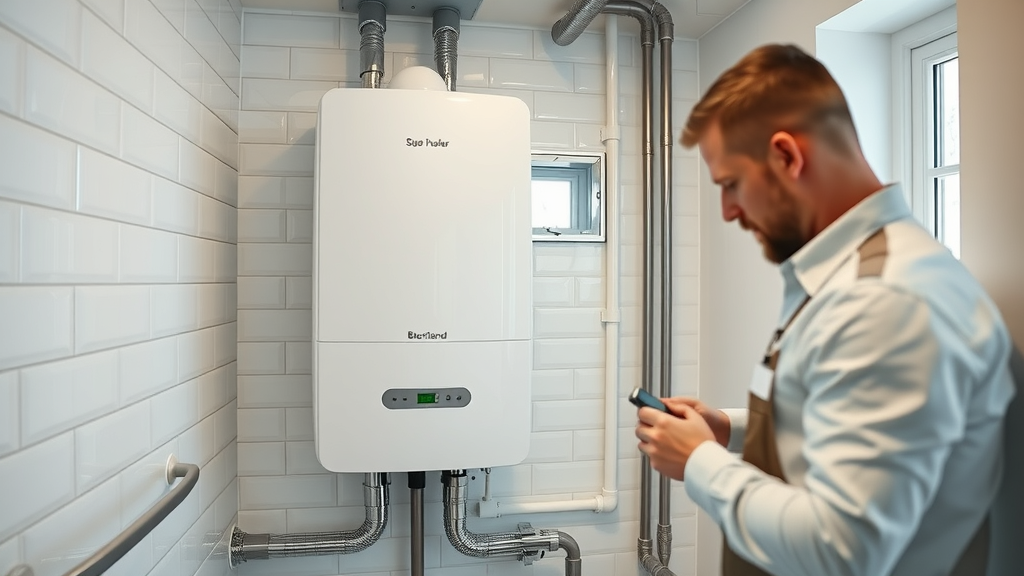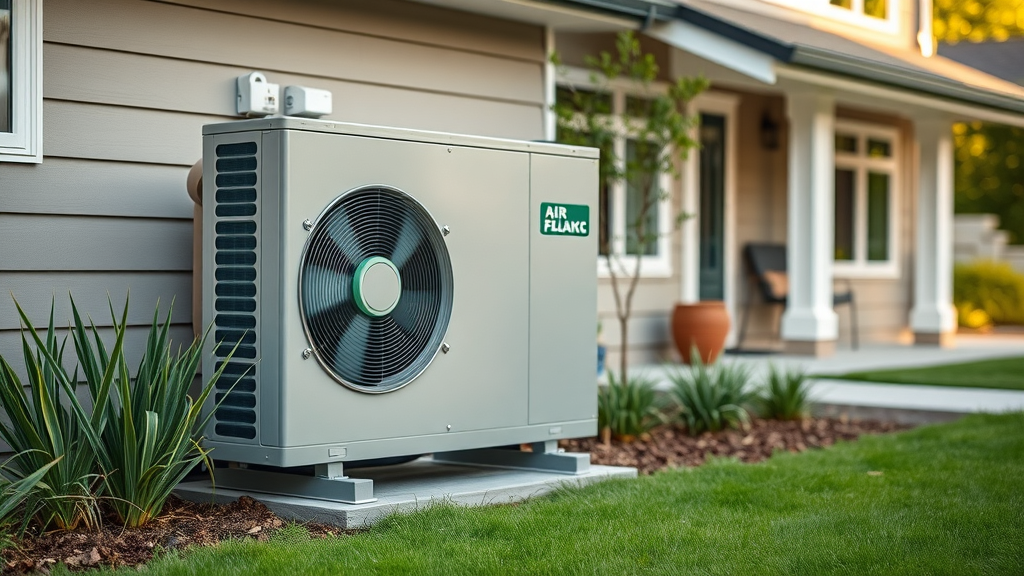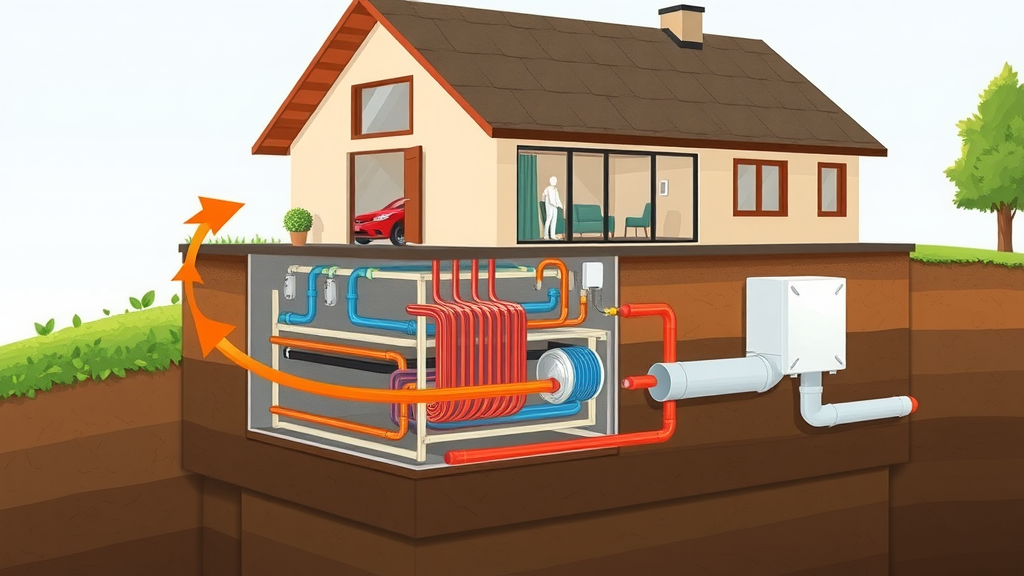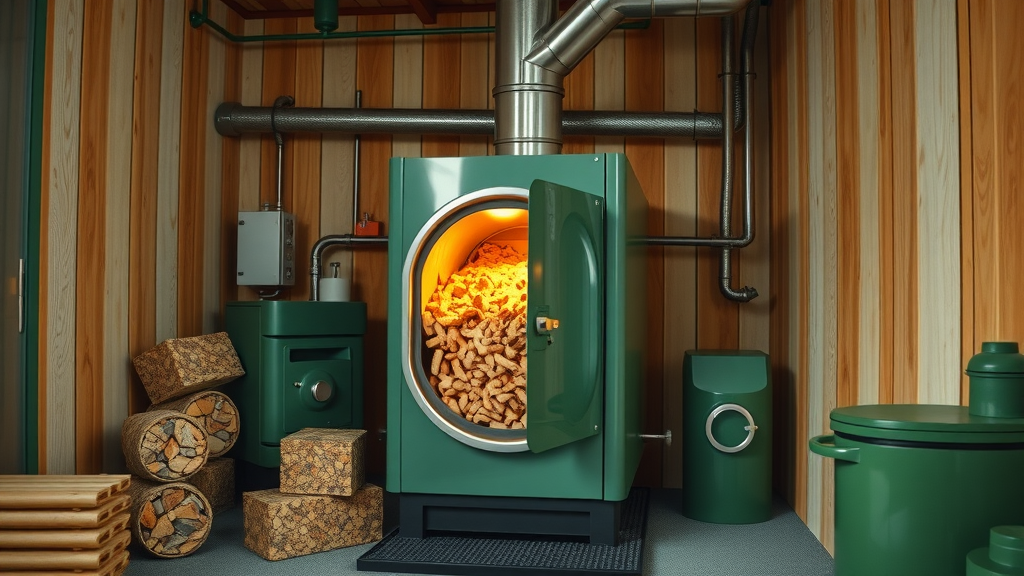
Imagine slashing your heating bills while enjoying comfortable warmth and a greener footprint. This guide reveals everything you need to know about energy-efficient heating systems —from high-performance options and real savings stats to expert guidance on selection and maintenance. Whether you're aiming to reduce expenses long-term, shrink your carbon impact, or simply stay cozy, harnessing modern heating technology puts those goals within reach.
With countless choices on the market, it's crucial to understand which systems deliver on their promise of efficiency and cost reduction. Here, you'll find practical advice, clear comparisons, and actionable insights designed for every homeowner. Read on, and start discovering how you could transform your home's comfort and budget—beginning this heating season!
Discover How Energy-Efficient Heating Systems Drastically Reduce Your Home's Utility Bills
Energy-efficient heating systems are revolutionizing the way modern homes stay warm, not only providing reliable comfort but also offering significant savings on utility bills. As homeowners face the dual challenge of rising energy prices and environmental responsibility, the search for the most efficient heating solutions has never been more critical. Efficient heating technologies optimize fuel or electricity use, so less energy is wasted and monthly bills shrink. For example, condensing boilers extract maximum heat from their fuel, while advanced heat pumps leverage ambient air or underground warmth, requiring less input to output more heat.
Installing a quality energy-efficient heating system, such as an air or ground source heat pump, can yield annual savings of hundreds—even thousands—of pounds over older, less efficient alternatives. Beyond immediate financial rewards, these systems offer quieter operation, reduced emissions, and eligibility for government incentives. For families upgrading from aging boilers or electric heaters, switching to a cutting-edge solution isn’t just a cost-saver—it's a step forward in home value, sustainability, and personal comfort. Thanks to today’s wide array of choices, almost any property can benefit from making the transition.
- The types of energy-efficient heating systems available
- How each system functions and its benefits
- Key savings statistics and comparisons
- Professional advice on choosing and maintaining your system
- Answers to common heating efficiency questions
Types of Energy-Efficient Heating Systems for Modern Homes

Modern homes benefit from a diverse range of energy-efficient heating systems designed for every budget and property type. Four of the most popular and effective options are condensing boilers, air source heat pumps, ground source heat pumps, and biomass boilers. Each technology offers unique advantages, from ultra-low emissions and fuel flexibility to exceptional longevity and compatibility with renewable energy sources.
The common thread among these choices is efficiency : they convert energy into heat with remarkable effectiveness, oftentimes recycling waste warmth or leveraging renewable resources to maximize outputs. Understanding the core features and suitability of each system empowers homeowners to make informed decisions tailored to their space, climate, and budget—all while securing substantial long-term savings.
Condensing Boilers: The Gold Standard of Energy-Efficient Heating Systems
Condensing boilers are often called the gold standard for efficient, reliable heating in modern households. Unlike traditional boilers, they recover more heat from exhaust gases before releasing them, resulting in up to 90% efficiency. This advanced mechanism significantly reduces waste, slashing both carbon emissions and heating bills. As a result, condensing boilers are particularly appealing to homeowners seeking straightforward installation that’s compatible with conventional radiator systems or underfloor heating.
Annual savings after switching to a condensing boiler can range from £200 to £300, particularly in homes transitioning from old non-condensing models. Thanks to their durable design and low maintenance requirements, these systems also minimize unexpected repair costs. If you want stellar performance, compact form factors, and straightforward operation, a condensing boiler is a leading contender in the field of energy-efficient heating systems.
Air Source Heat Pumps: Sustainable Energy-Efficient Heating Systems for Any Property

Air source heat pumps (ASHPs) are fundamentally transforming how UK properties—and homes worldwide—achieve year-round comfort. These units draw heat from the ambient outdoor air, even during colder months, and deliver that warmth efficiently into your living spaces. With a typical efficiency rating of 300% (they produce three units of heat for every unit of electricity consumed), air source heat pumps outperform most traditional options, leading to annual energy bill reductions of £400–£500.
Air source heat pumps are flexible enough for most homes, require moderate maintenance, and are supported by generous government incentives in many regions. They’re an eco-friendly option for new builds and retrofits alike. Quiet in operation and simple to control, ASHPs represent an accessible gateway for families aiming at lower bills and smaller carbon footprints—all while futureproofing their home for years to come.
Ground Source Heat Pumps: Going Deeper for Maximum Heating Efficiency

Ground source heat pumps (GSHPs) take the concept of efficiency a step further by harnessing stable temperatures underground. Their network of buried coils absorbs ambient heat from soil (or water), which is then concentrated and distributed throughout your home. This method results in superb performance, particularly for larger properties or those with enough outdoor space for coil installation.
Though initial costs are higher—GSHPs often start around £12,000—the energy savings are outstanding, reaching £600–£700 per year. These systems require little maintenance due to fewer moving parts and benefit from exceptional lifespans of 20+ years. For homeowners with the space, the investment pays off in unmatched comfort, low ongoing costs, and remarkable reductions in environmental impact.
Biomass Boilers: Eco-Friendly Energy-Efficient Heating Systems

Biomass boilers provide a renewable twist on traditional heating, burning organic material such as wood pellets or chips to generate warmth. Thanks to highly efficient combustion processes and carbon-neutral fuel sources, modern biomass systems can cut heating costs by £450–£600 a year while delivering consistent, reliable comfort.
For eco-conscious households, biomass boilers are particularly suitable, offering a viable alternative to fossil fuel-based systems. While their upkeep is more involved—requiring regular fuel top-ups and periodic cleaning—the environmental benefits and potential eligibility for government support schemes make them a compelling choice in the movement toward true home heating sustainability.
Comparing Energy-Efficient Heating Systems: Savings, Longevity, and Maintenance
When evaluating energy-efficient heating systems , it's helpful to compare up-front investment, expected payback, and maintenance demands. Below is a detailed comparison of the top four technologies discussed above to guide your decision-making:
| System | Upfront Cost | Estimated Annual Savings | Lifespan | Maintenance Needs |
|---|---|---|---|---|
| Condensing Boiler | £2,500 | £200-£300 | 12-15 years | Low |
| Air Source Heat Pump | £6,000 | £400-£500 | 15-20 years | Medium |
| Ground Source Heat Pump | £12,000 | £600-£700 | 20+ years | Low |
| Biomass Boiler | £9,000 | £450-£600 | 15-20 years | Medium |
As this comparison shows, each system balances cost, savings, and ease-of-maintenance differently. Condensing boilers offer a fast return for modest investments, while ground and air source heat pumps yield the highest savings over longer periods. Assessing your individual needs and budget is essential for maximizing the value of any energy-efficient upgrade.
How to Choose the Right Energy-Efficient Heating System for Your Space
Selecting the ideal energy-efficient heating system for your home can feel overwhelming with so many choices available. However, a systematic approach focusing on your property’s specifications, existing infrastructure, climate, and financial goals will help narrow the options. Consulting with a trusted professional ensures that the system you choose fits your unique requirements while maximizing future savings.
Consider how long you plan to remain in your home, the availability of government grants, and compatibility with existing radiators or underfloor heating. Taking the time to evaluate all variables will streamline your decision, minimize installation headaches, and guarantee years of cost-effective comfort.
Assessing the Size and Needs of Your Home for Maximum Efficiency
Efficiency starts with matching your system to your home’s needs . Larger houses with open-plan living areas or multiple bathrooms may benefit from powerful heat pumps or biomass boilers, while smaller properties can still enjoy savings with a modern condensing boiler. An expert heating engineer can calculate your property’s precise heat demand, factoring in insulation levels, double glazing, and occupancy patterns.
Oversized systems waste energy and money, while undersized units struggle to maintain comfort, so a tailored approach is crucial. If you’ve recently upgraded insulation or completed renovations, a smaller and more affordable heating solution might now be viable, further reducing both installation and running costs.
Budget Considerations: Upfront Costs vs. Long-Term Savings
It’s vital to balance the initial expense of a new energy-efficient heating system against projected long-term rewards. While ground source heat pumps and biomass boilers carry higher upfront price tags, their superior efficiency often results in rapid payback and substantial future savings. Homeowners with limited capital may opt for a condensing boiler or air source heat pump, knowing upgrades can still yield marked drops in monthly bills.
Check for available grants or low-interest finance programmes that can offset initial outlays. Over the lifespan of your system, those upfront costs are typically recouped many times over in fuel savings—and efficient systems add value to your property, enhancing resale potential.
Local Climate and Building Regulations Impacting Your Energy-Efficient Heating Systems
The efficiency of any heating solution is closely linked to your region’s climate and building regulations. Air source heat pumps perform especially well in moderate climates, while ground source systems deliver robust efficiency in even the coldest regions. Building codes or local ordinances may affect which systems can be legally installed, especially with biomass options or exterior heat pump units.
Consult local council planning and speak with accredited installers to ensure your upgrade complies with all requirements. Some areas may offer extra incentives for residents adopting low-carbon heating, offsetting costs and accelerating your journey to lower bills and emissions.
Top Expert Tips to Maximise the Performance of Energy-Efficient Heating Systems
Even the best energy-efficient heating systems rely on proper usage and upkeep to deliver full value. Following proven advice from seasoned professionals helps ensure you get the most out of your investment, year after year.
- Schedule regular professional maintenance for best results
- Install smart thermostats and controls
- Upgrade your insulation
- Monitor your energy usage with digital tools
Seasonal checkups guarantee that heat pumps, boilers, and biomass units retain optimal efficiency, and prevent minor issues from becoming costly repairs. Adopting smart tech empowers you to fine-tune settings and monitor consumption in real time, further trimming waste. Simple home improvements, such as attic insulation or draught-proofing windows, complement your heating investment, maximizing comfort and minimizing costs.
"Switching to energy-efficient heating systems can cut heating costs by up to 50%, while significantly reducing your carbon footprint." – Ed Serrell, Industry Expert
Common Questions About Energy-Efficient Heating Systems
- Which energy-efficient heating system is best for older properties? Older or less insulated homes may benefit most from a combination of a modern condensing boiler and upgraded insulation. Heat pumps can also work well when paired with energy-saving renovations and appropriate-sized radiators.
- How soon can I expect a return on investment? Most homeowners see payback within five to ten years, depending on the system chosen, energy prices, and available grants. Systems like ground source heat pumps tend to have longer payback periods but exceptional lifetime savings.
- Are grants or incentives available for installing energy-efficient heating systems? In the UK and many other countries, various schemes, rebates, and loans are available to help offset the upfront cost of efficient systems. Local government websites and certified installers can provide current details for your area.
- Can I combine multiple systems for even greater efficiency? Yes! Hybrid systems—such as pairing a heat pump with a condensing boiler—can deliver maximum savings and flexibility, covering both hot water and heating needs in the most efficient way possible.
Your Next Steps to Save with Energy-Efficient Heating Systems
Upgrading to an energy-efficient heating system doesn’t just cut costs; it boosts comfort, slashes emissions, and futureproofs your home for decades. The next move is simple: research your options, seek expert advice, and start planning your upgrade for real, lasting benefits.
Contact Ed Serrell Plumbing and Heating for Personalised Energy-Efficient Heating System Advice
For expert help or advice from Ed Serrell Plumbing and Heating call 0796 688 4368 , or email info@edsplumbing.co.uk
Take action now to enjoy lower bills, guaranteed comfort, and a greener future!Act today: choose, install, and maintain the right system—your comfort and savings begin now.
Sources
- Energy Saving Trust – https://energysavingtrust.org.uk/advice/energy-efficient-heating/
- UK Government Home Energy Efficiency Schemes – https://www.gov.uk/guidance/home-energy-efficiency-schemes
- Which? Heating Types – https://www.which.co.uk/reviews/boilers/article/types-of-boiler-and-furnace-heating-ai8dh7n8g2LB
To further enhance your understanding of energy-efficient heating systems, consider exploring the following resources:
-
“Heat Pump Systems” : This comprehensive guide from the U.S. Department of Energy explains how heat pumps operate, their efficiency benefits, and the different types available, helping you determine if a heat pump is suitable for your home. ( energy.gov )
-
“Air Source Heat Pump Costs – How Much Should You Budget for One?” : This article provides detailed insights into the costs associated with air source heat pumps, including installation expenses, potential savings, and factors influencing overall costs, assisting you in budgeting for an energy-efficient upgrade. ( homebuilding.co.uk )
If you’re serious about reducing your heating bills and enhancing home comfort, these resources will provide valuable information to guide your decision-making process.
 Add Row
Add Row  Add
Add 




Write A Comment